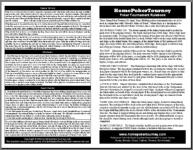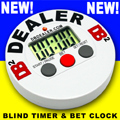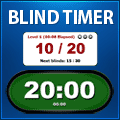|
|
TDA Rules 2009
Poker Tournament Directors Association

TDA Rule Book 2009
- 1. Floor People
- Floor people are to consider the best interest of the game and fairness as the top priority in the decision-making process.
Unusual circumstances can on occasion dictate that decisions in the interest of fairness take priority over the technical rules.
The floor person’s decision is final.
- 2. Chip Race
- When it is time to color-up chips they will be raced off with a maximum of one chip going to any player. The chip race will
always start in the No.1 seat. A player cannot be raced out of a tournament: a player who loses his or her remaining chip(s) in
a chip race will be given one chip of the smallest denomination still in play. Players are encouraged to witness the chip race.
- 3. Odd Chips
- The odd chip(s) will go to the high hand. In flop, games when there are two or more high hands or two or more low hands the
odd chip(s) will go to the left of the button. In stud games, the odd chip will go to the high card by suit. However when hands
have identical value (e.g., a wheel in Omaha/8) the pot will be split as evenly as possible.
- 4. Side Pots
- Each side pot will be split separately.
- 5. Calling for a Clock
- Once a reasonable amount of time has passed and a clock is called for, a player will be given a maximum of one minute to make
a decision. If action has not been taken before time expires, there will be a 10-second countdown. If a player has not acted by the
time the countdown is over, the player’s hand will be dead.
- 6. Dead Button
- Tournament play will use a dead button.
- 7. Penalties and Disqualification
- A penalty MAY be invoked if a player exposes any card with action pending, throws a card off the table, violates the
one-player-to-a-hand rule, or similar incidents take place. Penalties WILL be invoked in cases of soft play, abuse, or
disruptive behavior. Penalties available to the TD include verbal warnings and “missed hand” penalties. A missed
hand penalty will be assessed as follows: The offender will miss one hand for every player, including the offender, who is at
the table when the penalty is given multiplied by the number of rounds specified in the penalty; for the period of the penalty
the offender shall remain away from the table. Tournament staff can assess one-, two-, three-, or four-round penalties or
disqualification. A player who is disqualified shall have his or her chips removed from play. Repeat infractions are subject
to escalating penalties.
- 8. At Your Seat
- A player must be at his or her seat by the time all players have been dealt complete initial hands in order to have a live hand.
Players must be at their seat to call time.
- 9. Face Up
- All cards will be turned face up once a player is all-in and all betting action is complete.
- 10. Raise Requirements
- If a player puts in a raise of 50% or more of the previous bet but less than the minimum raise, he or she will be required to make
a full raise. The raise will be exactly the minimum raise allowed. In no-limit and pot limit, an all-in bet of less than a full
raise does not reopen the betting to a player who has already acted.
- 11. Oversized Chip
- A single oversized chip will be considered a call if the player does not announce a raise. If a player puts an oversized chip into
the pot and states raise but does not state the amount, the raise will be the maximum allowable up to the size of that chip. After
the flop, an initial bet of a single oversized chip without comment will constitute the size of the bet. To make a raise with a single
oversized chip a verbal declaration must be made before the chip hits the table surface.
- 12. No Disclosure No Advice One Player to a Hand
- Players are obligated to protect the other players in the tournament at all times. Therefore, players, whether in the hand or not,
may not:
1. Disclose contents of live or folded hands
2. Advise or criticize play before the action is complete
3. Read a hand that hasn’t been tabled
The one-player-to-a-hand rule will be enforced.
- 13. Random Seats
- Tournament and satellite seats will be randomly assigned.
- 14. Official Language
- The English-only rule will be enforced in the United States during the play of hands. English will be used in international play
along with the local or native language.
- 15. Communication Devices
- A player may not use a cellular phone, text-messaging device, or other communication device at the table.
- 16 Deck Changes
- Deck changes will be on the dealer push or level changes or as prescribed by the house. Players may not ask for deck changes.
- 17. New Limits
- When time has elapsed in a round and a new level is announced by a member of the tournament staff, the new level applies to the
next hand. A hand begins with the first riffle.
- 18. Re-buys
- A player may not miss a hand. If a player announces the intent to re-buy before a new hand begins, that player is playing chips
behind and is obligated to make the re-buy.
- 19. Higher Denomination Chips
- Visible Players must keep their higher denomination chips visible at all times.
- 20. Declarations
- Verbal declarations as to the content of a player’s hand are not binding; however, any player deliberately miscalling his or
her hand may be penalized.
- 21. Rabbit Hunting
- No rabbit hunting is allowed.
- 22. Dodging Blinds
- A player who intentionally dodges (a) blind(s) when moving from a broken table will incur a penalty.
- 23. Chips Visible
- All chips must be visible at all times. Players may not hold or transport tournament chips in any manner that takes them out of
view. A player who does so will forfeit the chips and will face disqualification. The forfeited chips will be taken out of play.
- 24. Breaking Tables
- Players going from a broken table to fill in seats assume the rights and responsibilities of the position. They can get the big
blind, the small blind, or the button. The only place they cannot get a hand is between the small blind and the button.
- 25. Balancing Tables
- In flop games when balancing tables, players will be moved from the big blind to the worst position (which is never the small
blind). The table from which a player is moved will be as specified by a predetermined procedure. Play will halt on any table that
is three or more players short. In stud games players will be moved by position, (the last seat to open up at the short table is
the seat to be filled).
- 26. Raises
- There is no cap on the number of raises in no-limit games. A raise must be at least the size of the previous raise. In limit
events there will be a limit to raises even when heads-up until the tournament is down to two players; the house limit will apply.
- 27. Misdeals
- In stud-type games, if any of the players’ two down cards are exposed due to dealer error it is a misdeal. In flop games,
exposure of one of the first two cards dealt is a misdeal. Players may be dealt two consecutive cards on the button.
- 28. Unprotected Hands
- If a dealer kills an unprotected hand, the player will have no redress and will not be entitled to a refund of bets. However, if
a player had raised and the raise had not yet been called, the raise will be returned to the player.
- 29. Killing Winning
- Hand Dealers cannot kill a winning hand that was tabled and was obviously the winning hand. Players are encouraged to assist
in reading tabled hands if it appears that an error is about to be made.
- 30. Verbal Declarations
- Verbal declarations in turn are binding. Action out of turn may be binding and will be binding if the action to that player has
not changed. A check, call, or fold is not considered action changing.
- 31. Exposing Cards
- A player who exposes his cards with action pending may incur a penalty, but will not have a dead hand. The penalty will begin at
the end of the hand.
- 32. Methods of Raising
- In no-limit or pot-limit a raise must be made by (1) placing the full amount in the pot in one motion; or (2) verbally declaring
the full amount prior to the initial placement of chips into the pot; or (3) verbally declaring “raise” prior to the
placement of the amount to call into the pot and then completing the action with one additional motion.
- 33. Ethical Play
- Poker is an individual game. Soft play will result in penalties, which may include forfeiture of chips and/or disqualification.
Chip dumping will result in disqualification.
- 34. Pot Size
- Players are entitled to be informed of the pot size in pot-limit games only. Dealers will not count the pot in limit and
no-limit games.
- 35. Button in Heads-up
- When heads-up the small blind is on the button and acts first. When beginning heads-up play the button may need to be adjusted
to ensure that, no player takes the big blind twice in a row.
- 36. Etiquette Violations
- Repeated etiquette violations will result in penalties. Examples include unnecessarily touching other players cards or chips,
delay of the game, and excessive chatter. Players are required to act in turn.
- 37. Showdown
- At the end of last round of betting, the player who made the last aggressive action in that betting round must show first. If
there was no bet the player to the left of the button shows first and so on clockwise. In stud games, the player with the high board
must show first. In razz, the lowest board shows first.
- 38. Action Pending
- Players must remain at the table if they still have action pending on a hand.
- 39. String Raises
- Dealers will be responsible for calling string raises.
- 40. Playing the Board
- A player must show both cards when playing the board in order to get part of the pot.
Poker Tournament Directors Association
www.pokertda.com
|
























